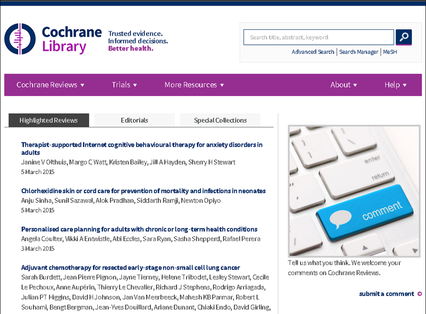Finding the evidence: systematic reviews and the Cochrane Library
Here you can find out about our training course on systematic reviews and access online support materials relating to systematic reviews and the Cochrane Library.
Our training session:
Our training session 'Systematic Reviews and the Cochrane Collection' will inform you about systematic reviews and where you can find them. It will also give you guidance on how to browse and search the Cochrane Library for systematic reviews. Contact us to book a training session (01709 427139 [email protected]): we can deliver training via MS Teams/phone, and we are still able to offer some limited training in the library with social distancing in place: please contact us for further details.
Online support materials:
- Read our guide to systematic reviews (below)
- Cochrane Library Training Hub
The Cochrane Library is a major source of high quality systematic reviews. The training hub aims to guide you through using the Cochrane Library by providing access to quick training videos, user guides and webinars.
https://www.wiley.com/network/cochranelibrarytraining - Joanna Briggs Institute Resources and Publications
The JBI has a collection of resources to support evidence based practice particularly systematic reviews. It features critical appraisal checklists and advice for putting evidence into clinical practice.
https://joannabriggs.org/ebp
What is a systematic review?
A systematic review:
How systematic reviews are conducted
A systematic review:
- is a review, of a whole body of data, which seeks to review all existing relevant studies on a particular topic
- helps decision-makers cope with the volume of literature by providing a scientific summarisation of the literature
- has clearly stated objectives and results from a comprehensive literature search strategy
- is explicit about its criteria for inclusion and exclusion of primary studies
- adheres to a strict design
How systematic reviews are conducted
- Searches are done in databases and hard copy journals appropriate for the focus of the review
- Citations are followed up
- Unpublished studies and ongoing research by experts are also sought
- More than one reviewer double reads all papers and each included study is analysed and appraised
- Sometimes a points system is used to score relevance and quality of reviewed papers (e.g. the Jadad scale - a system of critical appraisal)
- The statistical results of the studies are often combined using meta-analysis in order to identify a pattern in treatment effect
|
Finding systematic reviews
A search of the main NICE Evidence Search portal will find reviews from a range of sources, including the Cochrane Library. Use the filters to narrow your results to Evidence Based reviews, or Systematic Reviews. If you are looking specifically for systematic reviews, your best port of call is the Cochrane Database of Systematic Reviews. |
The Cochrane Library
The Cochrane Library is considered the best single source of reliable information on the effects of interventions in healthcare. It is provided online by Wiley Interscience and is freely accessible in many countries. The aim is on access for everyone and every Cochrane Review includes a plain language summary. It is updated daily.
Worldwide, more than 31,000 people, working in 53 Review Groups, contribute to writing systematic reviews for Cochrane. Reviews can take from one to five years to complete, as the quality is very high and the process is so rigorous.
The Cochrane groups also publish Protocols. These describe the proposed approach for a systematic review, detailing the question that the review authors are going to address and the criteria against which studies will be assessed for inclusion in the review. The protocol shows how the review authors intend to answer their research question.
The Cochrane Library is considered the best single source of reliable information on the effects of interventions in healthcare. It is provided online by Wiley Interscience and is freely accessible in many countries. The aim is on access for everyone and every Cochrane Review includes a plain language summary. It is updated daily.
Worldwide, more than 31,000 people, working in 53 Review Groups, contribute to writing systematic reviews for Cochrane. Reviews can take from one to five years to complete, as the quality is very high and the process is so rigorous.
The Cochrane groups also publish Protocols. These describe the proposed approach for a systematic review, detailing the question that the review authors are going to address and the criteria against which studies will be assessed for inclusion in the review. The protocol shows how the review authors intend to answer their research question.
|
The Cochrane Library home page gives you access to:
Tutorials are also available on how to use the Cochrane Library To access all search and browse options, click on "Advanced Search" on the home page. This will give you a range of options to choose from: |
You will find a "Search Help" link on each page, to give you more tips on how to search.
Browsing the Cochrane Database of Systematic Reviews
You can browse:
You can browse:
- By Topic – drill down through subjects until you find a review
- New Reviews – added in the last month
- Updated Reviews – updated in the last month
- A-Z – alphabetical list of protocols and/or reviews
- By Review Group – all reviews and protocols by a particular Cochrane Review Group
Searching the Cochrane Library
The main Search option allows you to enter key words and choose a record field in which you would like to retrieve those search terms (for example: record title, abstract, etc). This will search all the databases in the Cochrane Library and will list your results.
The Search Manager facility allows you to search for more complex topics. Enter the main key words of your search separately and then combine the results. This allows you to use synonyms and field labels, as well as operators which will influence your results.
The Medical Terms (MeSH) search allows you to incorporate subject headings from the thesaurus. It is a consistent way of retrieving information for the same concepts when different terminology may be used. These searches will be more complex and will make sure you pick up more relevant results.




